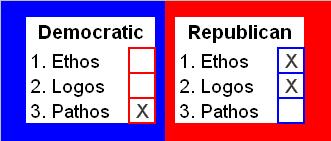
Eradicating Identity Politics
:: By: Larry Walker II ::
Those who say that Republican’s don’t like President Obama’s policies, solely because of the color of his skin, tend to forget that he’s also a member of the Democrat Party. In the United States, we basically have a two-party system comprised of Republicans (25%) and Democrats (31%). Even though the majority of us are independents (42%), who may at times be persuaded either way, we essentially have a two-party system with each side on opposite poles on just about every issue, foreign and domestic.
Generally, Republican voters stand for lower taxes, limited government, and a strong national defense; while Democrat voters slant towards higher taxes, an immense government, and a feeble defense. Both parties generally lean towards the preservation of individual liberties, except when it comes to certain aspects of the Affordable Care Act and an assortment of overbearing government regulations, but overall one would be correct in concluding that Republican voters disapprove of the Democrat Party’s policies period.
When it comes to President Obama, and the majority of Republicans feelings toward him, once this forgotten variable (the fact that he’s a Democrat) is added to the mix, one would be correct in stating that Republican voters don’t like President Obama because he adheres to Democrat Party policies. Say this and you’ve got it right. Say anything else and you’re a moron. When we are honest, and free of the poison of identity politics, we know this is the truth, but conflating differences in political ideology with racism is so far from reality that it borders on absurdity.
Political Racism
In short, racism is the belief that one race is superior to another. Formally defined, racism is, “the belief that all members of each race possess characteristics or abilities specific to that race, especially so as to distinguish it as inferior or superior to another race or races.” But is there such a thing as political racism? If so, let us clearly describe what it would look like.
First of all, each major political party is comprised of members of each and every race. So is it possible for White Republicans to believe their race superior to that of Black Democrats? No, but isn’t that what the hucksters are saying? If this were true, then wouldn’t White Republicans also have to believe themselves superior to Black Republicans, as well as to White Democrats? Assuming all of this was true, it would follow that Black Republicans must believe their race is superior to that of Black Democrats. Wait, isn’t this all just foolishness? Here’s a newsflash for you: White Republicans are not a race, neither are White Democrats, Black Republicans nor Black Democrats.
To have any validity whatsoever, such political racism would have to arise between members of the same political party. For example, if there were a Black male Democrat who believed in essentially the same things as, let’s say, a White female Democrat, and one chose to pull the race card in order to discredit and belittle the other, perhaps then you could make a case for racism. But to be viable, you must begin with members of the same political party, who agree 100% on everything, par for par, apples to apples, where the only difference between them is race. But even then, their disagreements may not be due to racism.
It may just be that only one member can hold the office up for grabs, and there are essentially no differences between them, other than race. Who do you vote for when this arises? Will it be that every time a Black candidate faces off against a White candidate, we must all goose step to the drumbeat of the Black candidate, regardless of his or her moral character, political affiliation or beliefs? Must the Black candidate win 100% to 0%, in order to dispel any allegation of racism? Following such an election, must the public then agree 100% with whatever policies the Black officeholder dictates, without question? Is this how we are to correct the racial injustices of centuries past?
Identity Politics
It turns out that what 21st century Democrats are slobbering about isn’t racism at all, but rather a form of identity politics. Through identity politics, social pressure is applied in an attempt to influence the majority to accept the beliefs or behavior of a minority. But, we should never confuse beliefs and behavior with race. I am a Black Conservative, and entitled to my own opinions. Thank you! If I don’t like your brand of politics, and your policies have negatively influenced my life, why in the world would you expect me to convert to your position?
What did you think would happen when the first Black President was spawned from the Democrat Party? Did you expect Republicans to change their ideology? Did you think a light would dawn in the minds of Republicans, wherein they would realize they had been wrong about low taxes, limited government, and a strong national defense, altogether? Did you expect the entire party to repent, and join ranks with the Democrat Party? Is that how you thought it was supposed to work?
Did all Democrat Party members suddenly drop their party allegiance and join ranks with Republicans when George W. Bush was elected to the presidency? No, they didn’t. Rather, they screamed, hollered, whined and protested constantly about almost everything the man did or said. So now that the shoe is on the other foot, the same bunch is crying racism. Those that didn’t bother to vote in the 2014 mid-term elections did us all a favor. They know better. Here’s another newsflash: Abstention is a vote.
Repealing Obamacare
It would not matter whether President Obama was White, Hispanic, Asian, straight, gay, male or female; Republicans would disagree with his, and the Democrat Party’s policies period. My personal feelings about Mr. Obama are thus: I despise the man and everything he stands for. I have nothing against his wife and children, and if he wasn’t the President, I wouldn’t have an opinion either way. In fact, before he ran for President, I kind of enjoyed hearing what he and his fellow left-wingers had to say. But my personal animosity towards him began on the day he started campaigning for the office. For me it’s not personal, it’s all about his brand and style of politics.
Here’s the crux: I don’t like anyone telling me I have to do something, or if I refuse I’m going to be punished. Here’s a prime example: “You have to join our religion, or else we’re going to cut your head off.” Well, come on and take your best shot. You see, it’s one thing to make improvements to our national health care system, which actually improve our health and lower costs, but entirely another when it boils down to the government commanding me to buy one of its prescribed insurance plans, or else I will be forced to pay a tax. Pardon my French, but eff that!
The fact is if Mr. Obama’s health insurance plans were so great, and so affordable, then no one would have to force me to buy one, I would happily do so. However, as things stand today, in my opinion, his plans suck, and I can’t afford either available combination of premiums, deductibles and out-of-pocket expenses. But what sucks even more is this notion that the federal government will impose an additional tax on me, for not complying with Mr. Obama’s individual mandate. The employer mandate is equally bad for America. Both should be repealed.
Whether you got a better deal through the Affordable Care Act, or nothing changed, you should realize that thousands upon thousands of your fellow Americans got screwed. My life was already tough enough without the government threatening to take more out of my pocket than it already takes, under the guise of this misnamed piece of legislation. They should rename it the “Either You Will Buy One of the Health Insurance Plans We Prescribe, or Else Hand Over a Percentage of Your Income to the Government Act”. The concept of play or pay doesn’t mesh with the ideal of liberty in my book. I should have enough freedom to say, “No thank you”.
The bottom line: Those of us who have adopted Conservative-Republican ideals will likely never join ranks with Democrats, no matter the identity of the Democrat Party leader du jour. Democrats can nominate anyone of their choosing next time, Black, White, Hispanic, Asian, mixed, feminist, gay or lesbian, Christian or Muslim, but it won’t alter Conservative-Republican political beliefs one iota. Masking unpopular and unjust political policies behind the aura of anyone’s personal identity is akin to identity theft. President Obama’s policies aren’t Black or White; they belong to the Democrat Party, and are thus mostly defective outside the realm of a classroom. It’s time we end this errant notion of identity politics, and resume arguing our ideological differences at face value.
Image Via: The Pittsfield Police Department
 Rick Perlstein said it best, “I believe politics is a team sport. That, for awful and unfortunate reasons beyond any of our control, the American system only allows, effectively, for two teams.”
Rick Perlstein said it best, “I believe politics is a team sport. That, for awful and unfortunate reasons beyond any of our control, the American system only allows, effectively, for two teams.”
